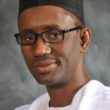On Sunday’s edition of Inside Sources with Laolu Akande on Channels TV, Professor Oyewole Tomori, a renowned virologist and former Vice Chancellor of Redeemer’s University, criticized Nigeria’s COVID-19 lockdown, calling it unnecessary. According to him, the initial fears, including predictions from global figures like Melinda Gates, were based on ignorance about the virus’ impact on Africa.
The virologist said the lockdown was unnecessary. He said “When COVID came, ignorant people like the Melinda Gates and others said when this things come that everybody were going to die in Africa. Everybody at the time were speaking out of ignorance because nobody knoew anything about COVID-19. We had evidence that COVID was speading but we were not dying. If we had analysed our own data, we would have been in a position to ask: Where do people congregate? In the church, in the slums etc where we have the mass of our people. Sometimes some of our African governments are so scared of going against the WHO.”
Prof. Tomori emphasized that, while COVID-19 spread in Nigeria, the fatality rate was much lower than expected. “We weren’t dying the way many feared,” he stated, arguing that Nigeria’s decision to impose strict lockdowns was more about fear of contradicting the World Health Organization (WHO) than responding to local realities. He suggested that a better approach would have been to analyze Nigeria’s specific data, identify high-risk areas like churches and slums, and focus on those places.
The professor also discussed the broader issue of Nigeria’s inability to produce vaccines. “It’s a desirable objective. We’ve done it before, and we need to do it again,” he said, blaming the delay on self-interest outweighing national priorities. He lamented that efforts dating back to 2005 had been stalled due to poor leadership and a lack of sustained commitment, despite the availability of resources.
Citing Nigeria’s successful response to the 2014 Ebola outbreak, Tomori called for better community engagement, improved disease surveillance, and greater local government involvement in public health management. He stressed the importance of equipping states with the necessary tools to handle disease control and called on the federal government to prioritize vaccine production, which he believes is well within Nigeria’s financial and technical capabilities.










